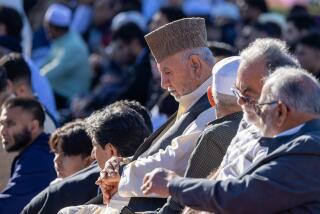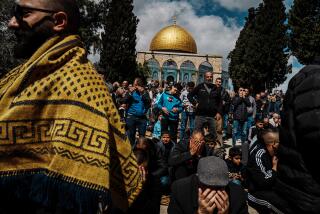Photo Essay : Scents to Tempt at Holiday Bazaar
- Share via
MURREE, Pakistan — In the many lands where people worship Allah, few torments can be as bittersweet as ambling through a bazaar in the Muslim holy month of Ramadan.
You can look. You can touch. You can even buy. But until the sun goes down and it grows so dark you cannot tell a white thread from a black, you cannot eat or drink and call yourself a pious Muslim.
In the days of the Raj, here in the cool, piney heights near the princely state of Kashmir, the British developed the hill station of Murree as a secluded spot--7,500 feet above sea level--where colonels and colonial administrators could seek respite from the heat and noise of the plains.
The men who kept the Indian jewel firmly in the British crown left behind at Murree the churches where they worshiped and double-story bungalows where officers on furlough pursued absent colleagues’ wives. Their old hill station, blessed with a climate of cool summers and crisp winters, is now a getaway and shopping destination for diplomats and government functionaries living in Pakistan’s capital, Islamabad, about two hours away by car.
As Ramadan entered its final Friday earlier this month, clumps of snow still dotted the shady side of the evergreen-shrouded slopes around Murree. To the bazaars flowed a motley, colorful stream of Kashmiris, Gujars, Kohistanis and other peoples who dwell in the surrounding highlands and vales.
It was the Pakistani equivalent of “only two shopping days left till Christmas”--the time to buy gaudy bangles and brand-new clothes for the post-Ramadan celebration, or fixings for the first feast held in daylight in a month.
Beggars, men and women, sat down on the Mall, the British-built shopping street flanked with teahouses, in hopes of provoking some holiday charity by exhibiting unseeing eyes or a gnarled foot. One could buy a ride to Rawalpindi aboard a bus painted as gaudily as a Ringling Brothers, Barnum & Bailey calliope, or a framed photograph of a lushly green golf course in Hawaii.
But most of all, there was the food: gold-skinned apples, hot fried and sugary pastries, bright red slabs of beef, hillocks of vegetables and freshly ground spices. Smiling, a small army of hawkers coaxed passersby to their wares.
But like Tantalus in the Greek fable, a customer could do anything but eat. When an American visitor unknowingly popped a fat black date in his mouth, he was gently but firmly taken to task. Did he not know, the merchant asked, that we were still in the time of fasting proclaimed by Mohammed, may peace be upon him?
More to Read
Sign up for The Wild
We’ll help you find the best places to hike, bike and run, as well as the perfect silent spots for meditation and yoga.
You may occasionally receive promotional content from the Los Angeles Times.






